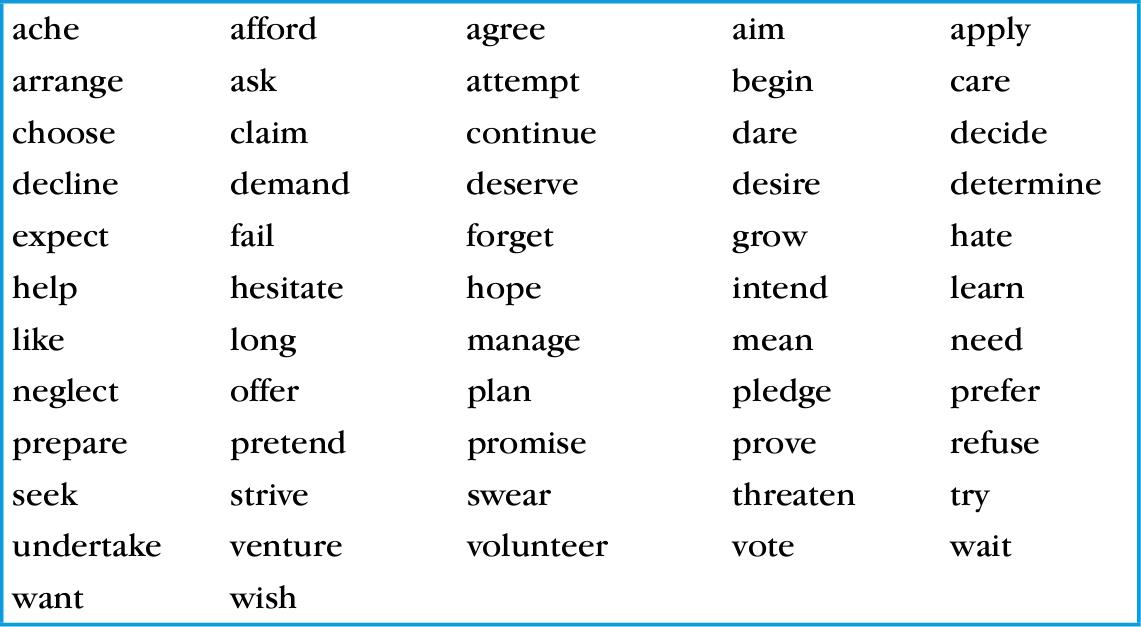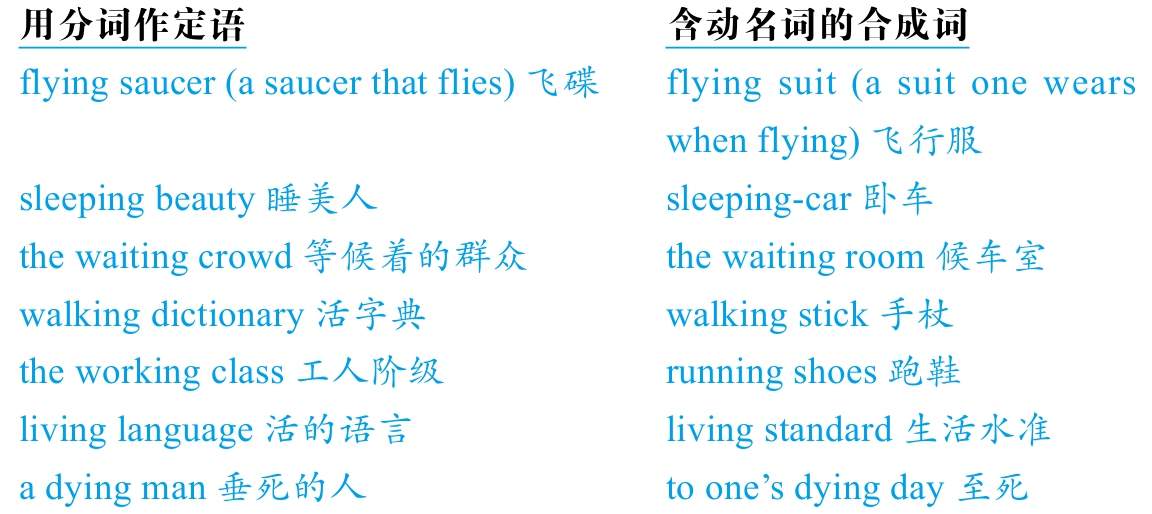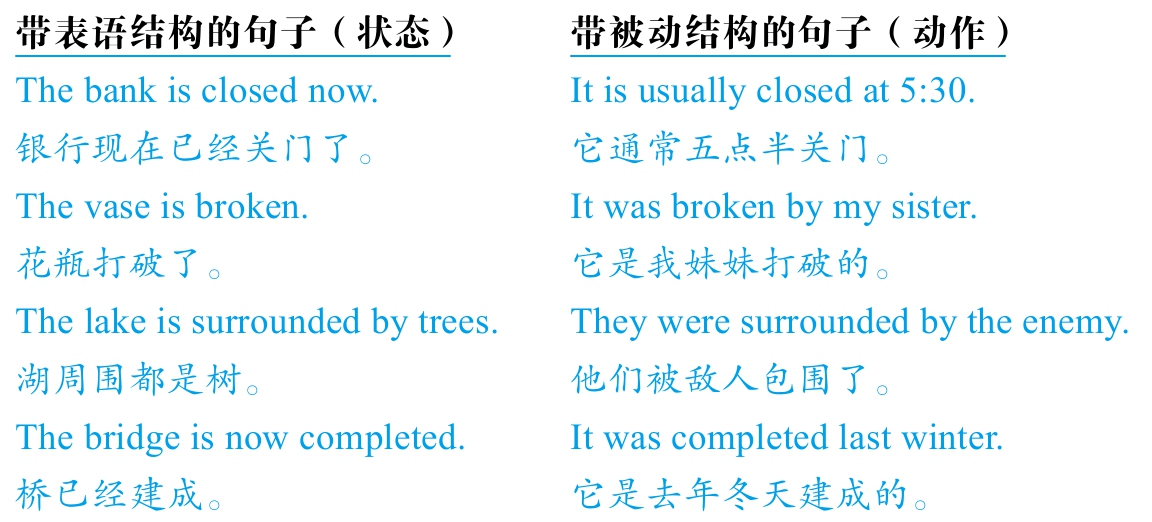




不定式有两种:(1)带to的不定式;(2)不带to的不定式:
She went out to do some shopping.(带to的不定式)
Let me do it.(不带to的不定式)
不带to的不定式和动词原形相同,也被称作bare infinitive(光秃不定式)。但在大多数情况下不定式都是带to的,因此,说不定式时通常都指带to的不定式。如果不带to,则要特别加以说明。
不定式在句中可以充当许多成分:
 构成谓语:
构成谓语:
You ought to know that. 你应当知道这一点。
 作主语:
作主语:
To talk to him is to talk to the wall. 和他讲话是对牛弹琴。
 作宾语:
作宾语:
What are you trying to do ? 你想干什么?
 与另一宾语构成复合宾语:
与另一宾语构成复合宾语:
I wish you to be happy . 我希望你快乐。
 作定语:
作定语:
Do you have anything to declare ? 你有什么东西要申报吗?
 作状语:
作状语:
They went to West Africa to see the wild animals . 他们到西非去看野生动物。
 作表语:
作表语:
Mary's task is to set the table . 玛丽的任务是摆桌子。
不定式仍具有动词的一些特点:
 可以有自己的宾语:
可以有自己的宾语:
I asked him to tell me his name . 我让他告诉我他的名字。
 可以有自己的状语:
可以有自己的状语:
I'd prefer to go by bike . 我宁愿骑自行车去。
 不定式具有时态和语态的形式,以表述不同意义:
不定式具有时态和语态的形式,以表述不同意义:

不定式加上它的宾语或状语构成不定式短语(infinitive phrases)。但为了简便起见,下面谈到不定式时都包括不定式短语。
不定式虽然不能有自己的主语,但在意思上仍可能有执行动作的人(或东西)。此称为逻辑上的主语(logical subject),如下面两句中的黑体词就是不定式逻辑上的主语:
She taught me to sing . 她教我唱歌。(是我唱歌)
I am glad to meet you . 我很高兴见到你。(是我见到你)
当逻辑上的主语和不定式有被动关系时,不定式就需要用被动形式:
There are a lot of things to be done . 有很多事要做。(事要被干)
不定式前面由for引导的短语,是它逻辑上的主语:
It's difficult for a foreigner to learn Chinese.外国人学汉语很困难。(a foreigner是to learn逻辑上的主语)
It is foolish for him to be selfish. 他如此自私,很愚蠢。
 不定式和某些被动结构构成的复合谓语:
不定式和某些被动结构构成的复合谓语:
She was considered to lack experience. 大家认为她缺少经验。
You are not supposed to act like that. 你不应当这样行事。
The strike is expected to end soon. 罢工估计不久即将结束。
A girl is reported to be missing. 据报道,一个女孩失踪了。
在构成这类谓语时,不定式有时用被动形式:
The box has to be handled with care. 这盒东西要轻拿轻放。
The book was due to be published in June. 这书定于六月出版。
还可用于完成形式(1)或进行形式(2):
(1)She seemed to have forgotten the whole thing. 她似乎把整个这件事都忘了。
You are supposed to have finished by now. 你现在应当已经干完了。
(2)He seemed to be sleeping . 他好像在睡觉。
What is she supposed to be doing ? 她现在应该在做什么呢?
不定式作主语可放在句首:
To err is human; to forgive is divine. 犯错误是人之常情,宽恕才难能可贵。
To know something about English is one thing; to know English is quite another. 懂一点英语是一回事,掌握英语完全是另一回事。
但在更多情况下是用it作先行主语,而把不定式(也就是真正的主语)放到句子后部:
It's important to know your own limitations. 知道自己的不足是重要的。
It isn't right for people to marry for money. 人们为钱而结婚是不对的。
What time would it be convenient for me to come again? 我什么时候再来比较方便?
It would be beneath me to notice it. 这事我不屑一理。
在这类结构中,不定式有时需用进行形式或完成形式:
It's a new experience for her to be travelling by plane.坐飞机旅行对她来说是个新经历。
It would have been amusing to have gone to the exhibition.要是去参观了那个展览会,会很有趣的。
 不定式用作宾语的时候特别多:
不定式用作宾语的时候特别多:
He pretended not to see me. 他假装没看见我。
Shelley attempted to get in touch with them. 谢利试图和他们联系。
能跟不定式作宾语的动词很多,常见的如:

用在help后的不定式可以加to,也可以不加,美国人不加to时较多(但被动结构中必须加to):
All this has helped ( to ) raise farm yields. 这一切都帮助提高了农业产量。
 不定式有时需用被动形式(1)或完成形式(2):
不定式有时需用被动形式(1)或完成形式(2):
(1)They deserved to be congratulated . 他们值得祝贺。
The old man declined to be helped across the street. 那位老人婉谢别人送他过街。
(2)They claimed to have shot down 22 planes. 他们声称击落了22架飞机。
She pretended not to have seen him. 她假装没看见他。
I remember to have seen him do it. 我记得曾看见他这样做。
有时可用进行形式:
I'd like to be flying over the Alps and looking down at the mountains.
我愿飞越阿尔卑斯山,俯瞰下面的群山。
 不定式有时和连接代词或连接副词连用:
不定式有时和连接代词或连接副词连用:
I ask him what to do . 我问他该怎么办。
I shall teach you how to cook . 我将教你(怎样)做饭。
有时不定式由whether引导:
He hasn't decided whether to go there by train or by plane.他还没决定是坐火车还是坐飞机去那儿。
I didn't know whether to laugh or cry about it. 我对此是啼笑皆非。
这种结构还可作介词的宾语:
She was worried about how to fill her leisure time . 她为如何打发她的闲暇时间而发愁。
Then there is the problem of what to tell the child . 然后,就是向孩子怎么讲的问题。
有时使用一个先行词it,而把不定式放到句子后部:
I have long had it in mind to answer your letter . 好久以来,我一直想回你的信。
She took it on herself to apologize for me . 她亲自出面替我道歉。
 在不少动词后可跟一个由名词(代词)+不定式构成的复合宾语:
在不少动词后可跟一个由名词(代词)+不定式构成的复合宾语:
The authorities advised citizens to be cautious of travelling to affected regions. 当局建议市民们谨慎前往受病毒影响的地区。
He instructed her to remain where she was. 他指示她留在原处。
不定式在这种结构中有时可用完成形式(1)或进行形式(2):
(1)The project is estimated to have cost £100,000. 这项工程估计花费了10万英镑。
(2)Thousands were reported to be working as slaves there.据报道,数以千计的人在那里当奴隶。
Miss White is supposed to be coming with me. 怀特小姐估计将和我一道去。
个别动词可以和一个介词短语连用,后面跟一个不定式:
I pleaded with him to tell me. 我恳求他告诉我。
We can count on them to support us. 我们可以指望得到他们的支持。
这类句子用于被动结构时不定式要加to:
The man was seen to enter the building. 有人看见那男子走进大楼。
She was heard to make some remark to her husband. 有人听见她和她丈夫说了一句话。
Serious efforts were made to prevent food contamination . 着力治理了食品污染问题。
在listen to和look at后也可跟这类复合宾语:
He sat listening to her climb the stairs. 他坐着听她爬上楼来。
Look at the boy run . 瞧那男孩儿跑着。
另外,不定式还可和一个连接代词或副词一道构成复合宾语:
I advised her where to stay . 我帮她出主意在哪里住。
He thought it right to resign . 他认为辞职是对的。
I don't think it worth while to go there. 我认为到那里去不值得。
He considered it his duty to go to the front. 他认为上前线是他的责任。
He made it a rule to take part in physical labour. 他规定自己去参加体力劳动。
 不定式常可用来修饰一样东西(或事物):
不定式常可用来修饰一样东西(或事物):
These are the steps to follow . 这些是应遵循的步骤。
It's difficult to find a place to park his car . 不容易找到停他车的地方。
不定式有时可用于被动形式:
The questions to be answered are on p.42. 应回答的问题在第42页。
Are you going to the banquet to be given at the embassy?你准备参加在大使馆举行的宴会吗?
 不定式也可用来修饰人:
不定式也可用来修饰人:
He had no one to talk to . 他没人可以交谈。
不定式有时需用被动形式:
She was the first person to be awarded such a prize . 她是第一个获得这种奖的人。
这类不定式前有时有一个for引导的短语作它们逻辑上的主语:
There may be an opportunity for you to see the premier . 你可能有机会见到总理。
There is no reason for us to doubt his words . 我们没有理由怀疑他的话。
 有时一个定语从句可以用不定式代替(多指将要发生的事):
有时一个定语从句可以用不定式代替(多指将要发生的事):
Perhaps in years to come we shall meet again. 或许在未来岁月中我们还会再见。
另外,which也可和不定式一起用,相当于一个缩短了的定语从句:
Now he had no pretext on which to prolong his stay . 现在他已没有继续留下去的借口。
Allow me one minute in which to change my costumes . 给我一点时间来卸装。
下面两句中的不定式可说是用作同位语,说明前面名词的内容:
Soon came the order to start the general attack . 很快下达了发起总攻的命令。
We got no instructions to leave the city . 我们没接到离开这座城市的指示。
不定式作状语的情况很多,主要有:
 be+形容词+不定式短语:
be+形容词+不定式短语:
(1)多数形容词都说明人的情绪、态度等:
He was shocked to hear her talking like that . 听到她这样讲话,他感到震惊。
He's keen to see his birthplace again . 他很想重见他的出生地。
(2)有一部分形容词可说明人的品质等:
You were foolish to believe what he said . 你相信他的话,太傻了。
He was generous to give you so much money . 他真大方,给你这么多钱。
(3)有少部分形容词可表示事情的难易等:
He is easy to get on with . 他很容易相处。
That man is hard to please . 让那人高兴很不容易。
(4)在大多数情况下这些形容词都指人,在个别情况下可以指物:
Your writing is impossible to read . 你的书法没法认。
The ambulance was ready to go . 救护车已准备好出发。
 不定式(短语)可用作目的(1)、原因(2)、结果(3)等状语:
不定式(短语)可用作目的(1)、原因(2)、结果(3)等状语:
(1)They strolled down the path to admire the garden . 他们顺小路溜达着去欣赏花园。
(2)I rejoice to hear that you are well again . 我很高兴听到你已经痊愈。
(3)We came home to find our garden neat and tidy . 我们回到家里,发现花园整整齐齐。
 不定式还可用在某些句型中作状语:
不定式还可用在某些句型中作状语:
(1)in order (not) to以便,为了(以免):
In order to do that , countries pledge to reduce their carbon emissions.为了做到这一点,各国都承诺减少碳排放。
We keep the window shut in order not to let flies in .我们把窗子关着,以免苍蝇进来。
(2)so as (not) to以便(以免):
The test questions are kept secret, so as to prevent cheating . 考题都保密,以防作弊。
Go in quietly so as not to wake the baby . 悄悄地进去,以免惊醒宝宝。
(3)so (such) as to到如此程度以致……:
Ruth wouldn't be so careless as to forget to lock the door .鲁思不会粗心到忘了锁门。
I'm not such a fool as to throw it away . 我没傻到把它扔掉。
(4)be so kind (good) as to可否劳驾……:
Will you be so kind as to answer a few questions ? 可否劳驾回答几个问题?
Would you be so good as to let me know as soon as possible ? 可否劳驾尽快通知我?
(5)be kind (good) enough to劳驾:
Mr. Hood has been kind enough to overlook it . 胡德先生好心不计较这个。
(6)too … to …太……不能:
It was too late to do anything now . 现在要做什么都已为时太晚。
Never too old to learn . 活到老,学到老。(谚语)
(7)(not) enough to …(不)够……来做某事:
She was not strong enough to travel . 她身子太弱,不能旅行。
We were fortunate enough to get an empty car . 我们很幸运,找到了一辆空车。
 不定式有时需要用被动形式(1)或完成形式(2),有时可用进行形式(3):
不定式有时需要用被动形式(1)或完成形式(2),有时可用进行形式(3):
(1)She left home, never to be seen again . 她离开了家,再也没有人见到过她。
(2)You're far too clever to have done that . 你太聪明了,不会这样做。
I'm pleased to have been given this opportunity . 给了我这次机会,我很高兴。
(3)He was happy to be coming home . 就要回家了,他感到高兴。
Are you glad to be going back to school ? 返回学校你感到高兴吗?
有时不定式前面有一个for引导的短语,表示它逻辑上的主语:
I'm quite willing for you to join us . 我很愿意你参加我们的活动。
The baby is too much for her to cope with . 孩子太麻烦,她难以对付。
 有时不定式短语可用来修饰整个句子:
有时不定式短语可用来修饰整个句子:
To tell you the truth , I've never heard of the book. 说真的,我从来没听说过这本书。
He is a nice person, to be sure . 他肯定是一个好人。
这种状语不修饰谓语,而说明说话人的想法。有人称之为独立成分。
 有时不定式在句中可用作表语,说明主语的具体内容或目的:
有时不定式在句中可用作表语,说明主语的具体内容或目的:
The first step is to check the victim's breathing . 第一步是检查受害人的呼吸。
This wall is to keep people out of the garden . 这堵墙为的是不让人到花园里来。
The most important purpose of first aid is to save someone's life .急救最重要的目的是救人生命。
 有时不定式表示一个动作:
有时不定式表示一个动作:
The best thing she ever did was to buy that house . 她干得最好的一件事就是买了那所房子。
有时(比如前面有“do”时)to可以省略:
What you have to do is (to) fill in the questionnaire . 你要做的是把问卷填好。
All I did was (to) press the button . 我只是按了一下按钮。
不定式有时可省略,只剩下to,以避免重复:
You don't have to go with us if you don't want to. 如果你不想跟我们去,可以不去。
动词的-ing形式在起名词作用时称为动名词。动名词在句中可以:
 用作主语:
用作主语:
Reporting the news is their job. 报道新闻是他们的任务。
 用作表语:
用作表语:
His job is collecting folk songs . 他的任务是收集民歌。
 用作宾语:
用作宾语:
Suddenly everybody stopped talking . 突然,大家都停止了谈话。
 用作介词宾语:
用作介词宾语:
She is interested in acting . 她对演戏有兴趣。
 构成合成名词:
构成合成名词:
Who won the swimming competition ? 游泳比赛谁获胜?
还可用在下面这样的句子中:
No smoking ! 禁止吸烟!
No parking . 禁止泊车。
动名词有几种形式:

它也可以有其宾语(1)或状语(2):
(1)The mayor is fond of making statements that provoke and at times befuddle the public. 这位市长喜欢发表煽动民众、有时又会让民众感到困惑的言论。
(2)Excuse me for coming late . 对不起,我来晚了。
它可以用一个代词或名词的所有格表示其逻辑上的主语:
He doesn't like her ( Jane's ) talking that way. 他不喜欢她(简)这样谈话。
有些动名词也变得接近名词或已变成名词,它可有复数形式(1),前面可加冠词(2),也可以有定语修饰(3):
(1)Dickens often gave readings of his work. 狄更斯常常朗读自己的作品。
(2)Who did the recording ? 谁录的音?
(3)I always enjoy a little light reading . 我总喜欢读点儿轻松的东西。
这些可称为名词化的动名词,有些已完全变成名词:
He kept his savings in the bank. 他把他的积蓄存在银行里。
She tore the wrappings off the present. 她把礼物的包装纸撕掉。
 动名词作主语有时放在句首:
动名词作主语有时放在句首:
Talking mends no holes. 空谈无济于事。(谚语)
Decorating the rooms takes time. 装饰这些房间要花时间。
 有时可用先行词it,而把动名词主语放到后面去。句中的表语可以是形容词(1),也可以是名词(2):
有时可用先行词it,而把动名词主语放到后面去。句中的表语可以是形容词(1),也可以是名词(2):
(1)It's difficult finding your way around here . 在这一带认路是不容易的。
I see that it is hopeless arguing about it . 我看为此争论毫无用处。
(2)It felt funny being called Grandmother . 被称作奶奶,感觉怪怪的。
Being lost can be a terrifying experience. 迷路有时很可怕。
有时前面还可加代词或名词所有格表示动名词逻辑上的主语:
Your going off in such a hurry is very risky. 你这样匆忙离去,十分冒险。
Their coming to help was a great encouragement to us.他们来支援,对我们是很大的鼓舞。
It has been a great honour your coming to visit me . 你来探访是我很大的荣幸。
在口语中有时可用宾格的代词表示动名词逻辑上的主语,但在正式语言中仍以用物主代词较好:
It's no good him (his) apologizing now that damage has been done. 既然损害已经造成,他道歉也没有用。
 There is 后有时可以跟动名词作主语:
There is 后有时可以跟动名词作主语:
There's no telling what will happen. 很难说将要发生什么事。
He is bad-tempered and selfish, there is no denying it . 他脾气暴躁,为人自私,这是不容置疑的。
 动名词还可用作表语:
动名词还可用作表语:
Her occupation is teaching . 她的职业是教书。
Seeing is believing . 眼见为实。
 有很多动词可用动名词作宾语:
有很多动词可用动名词作宾语:
I suggest doing it a different way . 我建议以另一种方式做这事。
I admit breaking the window . 我承认,窗子是我打破的。
She couldn't endure seeing animals cruelly treated . 她不忍心看到动物受到虐待。
 动名词可用作被动形式(1)或完成形式(2):
动名词可用作被动形式(1)或完成形式(2):
(1)He hated being laughed at . 他不喜欢被人笑话。
He narrowly missed being seriously injured . 他差点受了重伤。
(2)He denied having taken it . 他否认拿了它。
She regrets having said it . 她后悔说了这种话。
动名词前有时可有一个物主代词或名词所有格表示它逻辑上的主语:
I appreciate your helping me . 我感谢你帮助了我。
A severe cold prevented his attending the meeting . 重感冒使他未能来开会。
有时可用人称代词宾格(或名词)表示动名词逻辑上的主语,特别是在口语中:
I can not understand John making such a fuss. 我不能理解约翰这样大惊小怪。
I can't imagine my mother approving. 我不能想象我母亲也赞成。
be worth后也可用动名词作宾语:
What is worth doing is worth doing well. 值得干的事就得干好。(谚语)
 有些动词后可以用动名词作宾语,也可用不定式作宾语,但意思有时不同,试比较下面句子:
有些动词后可以用动名词作宾语,也可用不定式作宾语,但意思有时不同,试比较下面句子:
Remember to post the letters . 记得把这些信发出去。
I remember posting ( having posted ) the letters . 我记得这些信是发了的。
有时只有轻微的差别,如:
(1)在like, love, prefer, hate, dread等动词后,不定式多表示即将发生的事,而动名词多表示一般的情况:
I'd like to ask you a question . 我想问你一个问题。
I like travelling very much . 我很喜欢旅游。
I prefer to take the next train . 我宁愿坐下一班火车。
I prefer living in the country . 我更愿在农村住。
有时意思上没有差别:
I hate to be/being uninformed. 我不愿不了解情况。
She prefers to read/reading the editorial page. 她更愿意看社论版。
(2)在begin, start, intend, continue, bother和cease后,不定式和动名词都可以用,有时没有差别:
It has started to rain/raining. 开始下雨了。
They continued to meet/meeting daily. 他们继续每天都见面。
The buses have ceased to run/running. 那些公共汽车已经停止行驶。
有时也有轻微的差别,例如在begin, start和cease后,不定式多表示情况发生变化(1),而动名词表示有意识地开始(停止)(2):
(1)Suddenly it started to rain . 突然,下起雨来。
This has ceased to interest me . 这不再使我感兴趣。
(2)That year we began making the insecticide . 那年我们开始生产这种杀虫剂。
The factory has ceased making bicycles . 那家工厂已停止制造自行车。
另外,在以-ing结尾的动词后不宜再用动名词,以避免-ing的重复:
He was beginning to miss her. 他开始想念她了。
stop后面有时跟不定式作状语(而不是宾语):
He stopped to talk to me . 他停下来和我说话。
(比较:He stopped talking . 他停止讲话。)
 有许多由介词构成的短语动词后面可以跟动名词作宾语:
有许多由介词构成的短语动词后面可以跟动名词作宾语:
If two sides insist on speaking their own languages ,the EU employs interpreters. 如果双方都坚持说各自的语言,欧盟会安排翻译。
We looked forward to seeing him again .我们盼望再次见到他。
At last he succeeded in performing his task . 最后,他成功地执行了他的任务。
She was accustomed to traveling . 她已经习惯旅行了。
She must be fed up with studying . 她准是厌倦学习了。
在how (what) about后也常用动名词作宾语:
How about going for a walk ? 出去散散步如何?
What about sending him a copy ? 寄给他一本如何?
动名词还可和一些带介词的短语构成状语:
We walked down the stairs instead of taking the elevator .我们没坐电梯,而是顺楼梯走了下去。
Carol went to work in spite of feeling ill . 卡罗尔尽管感到不舒服,仍去上了班。
He left early for fear of missing the train . 他及早动身,唯恐误了火车。
 有些介词可以和动名词构成定语(1)或表语 (2):
有些介词可以和动名词构成定语(1)或表语 (2):
(1)The skill of speaking a foreign language takes time to acquire.说外语的技巧,要长时间才能养成。
He had no objection to getting up early . 他对早起没有反对意见。
(2)Robert was for cutting down the cost of production . 罗伯特主张降低生产成本。
I'm against doing anything till the police arrive.在警察到来之前我反对做任何事。
 介词后的动名词有时需用被动形式(1)或完成形式(2):
介词后的动名词有时需用被动形式(1)或完成形式(2):
(1)This question is far from being settled . 这个问题远没解决。
You can't eat anything before being operated on . 动手术前,你不能吃东西。
(2)I'm surprised at your not having noticed .你竟未注意到,我感到吃惊。
After having had a year's practice , he decided to make another effort.经过一年的练习,他决定再试一次。
动名词前有时用一个(物主)代词或名词所有格表示它逻辑上的主语:
I never dreamt of its hurting you . 我没想它会伤你的心。
I depend on your coming at seven o'clock . 我指望你七点钟来。
 动名词在很多情况下可和另一名词构成合成名词:
动名词在很多情况下可和另一名词构成合成名词:
living (sitting) room 客厅 dining car 餐车
swimming pool 游泳池 singing competition 歌咏比赛
sleeping pill 安眠药片 waiting room 候车(诊)室
parking lot (space)停车场(位)playing field 运动场
hearing aid 助听器 consulting room 诊室
cooking oil 食用油 operating room 手术室
running shoes (track)跑鞋(道)racing car 赛车专用车
filling station 加油站 fishing rod 钓竿
sewing machine 缝纫机 washing powder 洗衣粉
washing machine 洗衣机 cooling system 冷却系统
magnifying glass 放大镜 bathing suit 游泳衣
reading room 阅览室 sleeping bag 睡袋
weightlifting 举重
 还有一类动名词在后的合成词:
还有一类动名词在后的合成词:
window-shopping 逛商店(不买东西)sightseeing 观光
physical training 体育锻炼 handwriting 书法,笔迹
tap dancing 踢踏舞 air conditioning 空调(冷气)
central heating 集中供暖 zebra crossing 人行横道
data processing 数据处理 family planning 计划生育
water skiing 滑水 dry cleaning 干洗
house-warming 庆祝乔迁的晚会
有些以-ing结尾的词已经是名词,和其他名词没有差别,有的是可数名词,如:
beginning开头 human being 人 building 建筑物
drawing 图画 feeling 感觉 finding发现
hearing 听力,听 meaning意思 meeting 会议
painting 画 saying (俗)话 setting 布景,背景
suffering 苦难 turning 拐弯处 warning 警告
有些则用作不可数名词:
boating 划船 bowling 打保龄球 mountaineering 登山运动
surfing 冲浪 yachting 乘坐游艇 sewing 缝纫
在用作名词时,前面可加冠词或修饰语(如代词)(1),也可有复数形式(2):
(1)The coming of the transistor could not have been foreseen.晶体管的出现是未预料到的。
A ringing of bells marked the end of the old year. 一阵钟声标志着旧的一年结束。
(2)The findings of the Commission will be published today.委员会的调查结果将于今天发表。
She told me about her sufferings . 她跟我诉说了她的苦楚。
动词的-ing形式在起名词作用时为动名词,在起其他作用时则为现在分词。现在分词在句中可用来:
 构成谓语,主要是构成各种进行时态(1)和不定式的进行形式(2):
构成谓语,主要是构成各种进行时态(1)和不定式的进行形式(2):
(1)I'll be leaving tomorrow. 我明天动身。
He hasn't been feeling well recently. 他近来感到不大舒服。
(2)The battle was said to have been going on for two days.据说,战斗已经进行两天了。
 作表语:
作表语:
The speed of the horses was amazing . 这些马的速度惊人。
 作定语:
作定语:
They have won a resounding victory. 他们赢得辉煌的胜利。
 构成复合宾语:
构成复合宾语:
We saw a plane flying overhead. 我们看见一架飞机从头上飞过。
 作状语:
作状语:
She was busying packing her things. 她忙着收拾东西。
作为动词,它也可有自己的宾语(1)或状语(2),和它一道构成分词短语:
(1)He hurt his arm playing tennis . 他打网球,把胳膊弄伤了。
Don't stand there doing nothing . 别站在那里什么也不干。
(2)Taking a key out of the pocket , he opened the door.他从口袋里拿出了钥匙,把门打开。
I saw him walking along the street . 我看见他沿大街走去。
有时还可跟表语:
Feeling tired , I went to bed early. 我感到累,很早就睡了。
现在分词可有下面形式:

 现在分词常可用作表语,特别是那些表示情绪的词:
现在分词常可用作表语,特别是那些表示情绪的词:
His refusal to help was disappointing . 他不肯帮忙,很令人失望。
The conclusion that the 28 neutrinos came from beyond the solar system was convincing . 这28个中微子来自太阳系之外很有说服力。
 有不少现在分词和形容词差不多,甚至已成为形容词,它们常可用作定语:
有不少现在分词和形容词差不多,甚至已成为形容词,它们常可用作定语:
I have an amusing piece of news to tell you. 我有一条很有趣的消息要告诉你。
She found herself in an embarrassing position. 她发现自己处于尴尬的地位。
 还有一些由不及物动词变来的现在分词,不能用作表语,却可用作定语:
还有一些由不及物动词变来的现在分词,不能用作表语,却可用作定语:
an ageing population 老龄化的人口
increasing difficulty 日益增长的困难
living things 有生命的东西
prevailing trends 目前的趋势
the remaining question 剩下的问题
the rising generation 正在成长起来的一代
the ruling group 统治集团
falling objects 正在落下来的物件
a shining example 光辉的榜样
a promising young man 有前途的青年
developing countries 发展中国家
everlasting friendship 永恒的友谊
这类定语与构成合成词的动名词是有区别的,分词往往表示所修饰名词的动作,而动名词则表示目的、作用等。试比较下面词组:

 现在分词还可构成合成词作定语:
现在分词还可构成合成词作定语:
a long-running dispute 长期的争端 a time-consuming job 费时间的工作
quick-selling goods 快速售出的商品 a smooth-talking salesman 油嘴滑舌的推销员
close-fitting clothes 紧身衣服 never-ending complaints 没完没了的抱怨
far-reaching effects 深远的影响 a good-looking girl 漂亮姑娘
a record-breaking flight 创纪录的飞行 an epoch-making invention 划时代的发明
hard-wearing materials 耐磨的布料 hard-working peasants 勤劳的农民
long-lasting effects 长远的影响 earth-shattering news 震撼世界的新闻
oil-bearing crops 油料作物 fine-sounding words 动听的言辞
这些定语常可改为一个定语从句,中间包含一个进行时态(如which is coming, which was ringing, who were swimming, who was sitting next to me,等等)。有时分词短语改成的定语从句并不包含进行时态,而只是一个一般时态:
The road joining (= which joins ) the villages is very narrow.
连接两个村子的公路很狭窄。
I live in a pleasant room overlooking (= which overlooks ) the garden .我住在一间可以俯瞰花园的舒适的房间里。
 现在分词可用来构成复合宾语,用在某些动词后:
现在分词可用来构成复合宾语,用在某些动词后:
He caught the boys stealing his apples . 他撞见男孩子们偷他的苹果。
His question has set me thinking . 他的问题引起我深思。
在listen to和look at后也可跟复合宾语:
Listen to the birds singing . 听那些鸟儿歌唱。
Just look at the rain pouring down ! 瞧这倾盆大雨!
这类复合宾语和不定式构成的复合宾语在意思上是有差别的,现在分词多表示动作正在进行,而不定式表示动作已完成,试比较下列两类句子:


有时两种结构差别不大:
I saw the train coming ( come ) into the station. 我看见火车进站。
Did you notice him leaving ( leave ) the house? 你注意到他离开这房子了吗?
 上述结构可以变为被动结构,这时句子可以说包含了一个复合谓语:
上述结构可以变为被动结构,这时句子可以说包含了一个复合谓语:
The man was found lying on the floor . 那人被发现躺在地上。
Voices were heard calling for help . 有人听到呼救声。
有时现在分词可用于被动形式:
He was seen being taken away by the police . 有人看见,他被警察带走了。
They debated for hours without a decision being taken .他们辩论了几个钟头,却一个决定也没做出。
 在某些动词或词组后常可用现在分词作状语:
在某些动词或词组后常可用现在分词作状语:
She came running into the room . 她跑进屋来。
She stood at the door talking to a neighbour . 她站在门口和邻居谈话。
在不少情况下,现在分词还可表示一个次要的动作(这时它常有一个逗号把它和句子的主要部分分开):
She went out, saying she would be back in an hour . 她走了出去,说一个钟头后就回来。
He walked out of the room, slamming the door behind .他走出房去,砰的一声把门关上。
She lay awake all night, recalling the events of the day .她整夜躺在床上睡不着,回想着这天发生的事。
这类分词短语多数放在后面,和其他状语相似。
 分词短语作时间状语有以下三种情况:
分词短语作时间状语有以下三种情况:
(1)一个动作(多为简短动作)一发生,另一个动作即发生(分词短语多放在前面):
Taking a key out of his pocket , he opened the door.他从口袋里掏出钥匙,把门打开。(=After he took a key ...)
Turning around , she saw an ambulance driving up.她转过身,看见一辆救护车开了过来。(=When she turned around ...)
Hearing the news , they all jumped for joy. 听到这消息他们都高兴得跳了起来。
(2)在某一动作进行时,另一动作发生(这时分词短语前多加while或when):
Be careful when crossing the road . 过马路,要当心。(=When you cross ...)
He got engaged to her when travelling in Europe . 在欧洲旅行时,他和她订了婚。
(3)在做某事时另一事发生(有时也可不加when或while):
He cut himself shaving (=When he was shaving). 他刮胡子时,把脸刮破了。
The man slipped and fell (when) getting off the bus . 那人下公共汽车时,滑了一跤。
 现在分词短语有时表示原因(相当于一个表示原因的状语从句):
现在分词短语有时表示原因(相当于一个表示原因的状语从句):
Not knowing her address , I wasn't able to contact her.由于不知道她的地址,我没法和她联系。
有时现在分词要用完成形式,表示这动作已经发生:
Having been ill for a long time (=As he had been ill ...) he needed time to recover.由于他病了很长时间,他需要一段恢复的时间。
Not having received an answer , she decided to write him another letter.由于没得到他的回信,她决定再给他写一封信。
这种完成形式还可用作时间状语:
Having found a hotel , we looked for somewhere to have dinner.在找好旅馆之后,我们就去找吃饭的地方。(=After we found ...)
 在很多情况下现在分词(短语)表示一个伴随的情况或方式:
在很多情况下现在分词(短语)表示一个伴随的情况或方式:
Her husband died in 1942, leaving her with five children .她丈夫于1942年去世,给她留下五个孩子。
总的说来,现在分词作状语,主要用在书面语中,在口语中用其他结构更多些。
 在少数连词后,从句可以省略一些成分,只剩下现在分词(短语):
在少数连词后,从句可以省略一些成分,只剩下现在分词(短语):
He paused as if ( he was ) expecting Lanny to speak .他停顿了一下,仿佛在期待兰尼讲话。
Unless ( you are ) paying by credit card , please pay in cash.除非你用信用卡付款,否则你得付现金。
省略的词一般为从句的主语及助动词be。请注意,只有从句和主句的主语一致时,才能做这样的省略。
另外,在有些作状语的介词短语中,介词有时可以省略。因此,后面的动名词就成了现在分词:
There's no point (in) telling her about it . 告诉她,没有用。
She spent two months (in) writing the paper . 她花了两个月写这篇论文。
 独立结构:
独立结构:
在绝大多数情况下,现在分词都表示句子主语的动作:
She was lying in bed reading . ( She was reading .)
Sue got home, feeling very tired . (Sue was feeling very tired .)
但有时现在分词前可有一个名词或代词表示它逻辑上的主语:
It being a holiday (=As it was a holiday), all the shops were shut.由于今天是假日,所有商店都关门了。
There being no further business (=As there was no further business),I declared the meeting closed. 由于没有别的事了,我宣布闭会。
I'm playing golf this afternoon — weather permitting .今天下午我要打高尔夫球——如果天气允许的话。
这种带逻辑主语的现在分词称为独立结构(absolute construction)。
 有少数现在分词,并不表示句子主语的动作,而是表示说话人的态度,如:
有少数现在分词,并不表示句子主语的动作,而是表示说话人的态度,如:
Judging from what you say , he ought to succeed. 从你说的情况看,他应当能成功。
His acting was remarkable, taking into account his youth and ine xperience .考虑到他年轻没有经验,他的演出是不错的。
这类状语修饰整个句子,可说是一种独立成分(independent element),也可称作句子状语。
过去分词在句中可以:
 构成谓语:
构成谓语:
(1)和have一道构成完成时态及完成形式:
He is said to have written another TV play. 据说,他又写了一部电视剧。
(2)和be一道构成被动语态或被动形式:
All this could not have been foreseen . 所有这些都是无法预见的。
 作表语:
作表语:
Be prepared ! 做好准备!
 作定语:
作定语:
We're only got a little left . 我们只剩下一点儿了。
 构成复合宾语:
构成复合宾语:
We preferred the house painted white. 我们宁愿把房子漆成白色。
 作状语:
作状语:
Depressed , he went to see his elder brother. 他情绪低沉,跑去看他的哥哥。
过去分词在多数情况下都有被动意思,这从下面的大量例句中可以看出。但有一部分过去分词却并不如此,而是表示已发生的情况:
the risen sun 升起了的太阳 fallen leaves 落叶
faded flowers 凋谢的花 returned students 归国留学生
retired workers 退休工人 departed friends 离去的朋友
escaped prisoner 逃犯 the exploded bomb 爆炸了的炸弹
vanished jewels 消失了的珠宝 the newly arrived visitors 新到的客人
a swollen hand 肿起的手 a dated map 过时的地图
过去分词只有一种形式。
 过去分词作表语的时候很多(其中有些已变成形容词):
过去分词作表语的时候很多(其中有些已变成形容词):
He was convinced of the rightness of his position. 他相信他的立场是正确的。
I became acquainted with some of them. 我们和他们中间一些人熟识起来。
 这种结构和被动语态的差别:
这种结构和被动语态的差别:
这种“be+过去分词”的结构和被动语态是相似的,不同的是这种结构表示一种状态,而被动语态表示一个动作,试比较下面句子:

带表语结构的句子都包含一个系动词和过去分词,而带被动结构的句子的时态要与其相应主动结构句子的时态一致。(如:“It was broken by my sister.”中的主动结构为“My sister broke it.”,两者的时态是一致的。)换言之,表语结构由于表示状态,多数都用一般时态(在个别情况下也有用完成时态的,如:“They've been married for ten years.”他们结婚已经10年。),而被动结构的句子则要根据动作发生的时间来决定动词的时态。
 有些以ed结尾的词,并不是由动词变来的,如:
有些以ed结尾的词,并不是由动词变来的,如:
I'm ashamed of what I did. 我对我的行为感到羞愧。
We are indebted to you for your support. 我们感谢你的支持。
 有很多过去分词可用作定语,特别是表示情绪的词:
有很多过去分词可用作定语,特别是表示情绪的词:
The excited children are opening their Christmas presents.
激动的孩子们正在打开圣诞礼物。
A delighted audience demanded four encores. 高兴的观众要求她又唱了四支歌。
His troubled look frightened her. 他苦恼的表情使她惊恐。
 还有不少其他类型的过去分词可用作定语:
还有不少其他类型的过去分词可用作定语:
closed doors 关着的门 animated cartoons 动画片
mixed feelings 混杂的情绪 strained relations 紧张的关系
a furnished room 有家具的房间 an abandoned house 废弃的房子
armed forces 武装部队 boiled eggs 煮鸡蛋
steamed rice 米饭 fried fish 煎鱼
frozen food 冷冻食品 a broken heart 破碎的心
canned food 罐头食品 cooked food 熟食
dried fruit干果 hidden meaning 暗含的意思
revised edition 修订本 polluted rivers 被污染的河流
reduced prices 降低的价格 required courses 必修课
a broken leg 腿部骨折 fixed opinions 固定看法
processed food 加工过的食品 infected parts 受感染的部分
a forced smile 强笑 a corrected version 修改稿
finished products 成品 lost paradise 失去的乐园
guided missiles导弹 stricken area灾区
 还有一些由过去分词构成的合成形容词:
还有一些由过去分词构成的合成形容词:
an air-conditioned restaurant 有空调的餐馆
badly-paid workers 低工资的工人
well-equipped army 装备精良的军队
highly developed industry 高度发展的工业
a well-dressed woman 穿着讲究的女子
tree-lined avenues 两边有树的大街
a well-known artist 著名的画家
a powerfully built man 身材魁梧的男子
a simply-furnished room 陈设简单的房间
handmade goods 手工制品
a horse-drawn cart 马拉车
half-finished products 半成品
a well-behaved child 表现良好的孩子
但有很多由-ed结尾的形容词是由名词变来的,并不是过去分词:
armoured cars 装甲车 a bearded man 有络腮胡的人
a detailed account 详细的叙述 a gifted boy 有天分的男孩儿
salaried class工薪阶层 a skilled worker 熟练工人
concerted efforts共同的努力 a ragged old man衣衫褴褛的老人
有些合成形容词也是由“名词+ed”构成的:
absent-minded 心不在焉的 cold-blooded 冷血的
good-tempered 脾气很好的 kind-hearted 心地善良的
light-hearted 心情轻松的 one-sided 片面的
open-minded心胸开阔的 short-sighted 近视的
 有些现在分词短语跟在所修饰的名词后面,其作用接近于一个定语从句:
有些现在分词短语跟在所修饰的名词后面,其作用接近于一个定语从句:
The boy injured (= who was injured ) in the accident was taken to hospital. 在车祸中受伤的男孩儿被送到医院去了。
Some of the people invited (= who have been invited ) to the party can't come. 有些被邀请参加晚会的人不能来。
 作定语用的过去分词通常指已完成的动作,若要表示现在正进行的动作要用过去分词的进行形式:
作定语用的过去分词通常指已完成的动作,若要表示现在正进行的动作要用过去分词的进行形式:
We must keep a secret of the things being discussed (=which are being discussed) here.我们必须对这里讨论的问题保密。
What do you think of the summit meeting being held in Geneva ?你对正在日内瓦举行的高峰会议怎么看?
He knew nothing of the investigation being conducted . 他对正在进行的调查毫无所知。
如指未来的情况,都用不定式的被动形式:
They were not very interested in the election to be held the next month .他们对下月举行的选举不太有兴趣。
She made a list of things to be taken on the way . 她开了一份路上要带的东西的单子。
He prepared some poems to be recited at the English Evening .他准备了几首将在英语晚会上朗诵的诗。
 在某些动词后可用过去分词构成复合宾语:
在某些动词后可用过去分词构成复合宾语:
She got her suits dry-cleaned . 她把她的套服请人干洗了。
We'll keep you informed of how things are going with us .我们将让你了解我们这儿的情况。
 介词with后面有时可跟带过去分词的复合结构:
介词with后面有时可跟带过去分词的复合结构:
He sat with his arms clasped round his knees . 他手臂抱着膝盖坐着。
All afternoon he worked with the door locked . 整个下午,他锁着门工作。
 有时过去分词可以用作状语,修饰谓语:
有时过去分词可以用作状语,修饰谓语:
Viewed from a distance , the island looked like a cloud.从远处看,这座岛屿就像一朵云彩。(=When they were viewed...)
Born into a peasant family , he had only two years of schooling.他出生在农民家庭,只上过两年学。(=As he was born...)
从这些例子可以看出过去分词短语接近一个被动结构的从句。
 有些过去分词可以单独作状语:
有些过去分词可以单独作状语:
United we stand, divided we fall. 团结则存,分裂则亡。(谚语)
Frustrated , he went back to his home village. 他大失所望,回到了家乡。
 过去分词有时和连词一起用,接近状语从句的紧缩形式:
过去分词有时和连词一起用,接近状语从句的紧缩形式:
Although ( it was ) built before the war , the engine is still in perfect order. 尽管是战前制造的,这台发动机仍然处于良好状态。
If ( you are ) accepted for this post , you will be informed by May 1st.如果接受你担任这个职务,将于5月1日以前通知你。
Unless ( it is ) changed , this law will make life difficult for farmers.除非加以修改,否则这条法律将给农民的生活造成困难。
Metal expand when heated and contract when cooled . 金属热则膨胀,冷则收缩。
 在个别情况下,过去分词可引导短语,说明说话人的态度或条件:
在个别情况下,过去分词可引导短语,说明说话人的态度或条件:
Granted his honesty , he may be mistaken. 即使说他是诚实的,他也可能错了。
They may swim provided an adult accompanies them .如果有大人陪他们去,他们可以游泳。
Given good health , I hope to finish the work this year.如果我身体状况良好,我希望今年能完成这项工作。
还可构成下面这类状语(分词前有一个逻辑上的主语):
Everyone helped, John not excepted . 大家都来帮忙,约翰也不例外。
Everyone laughed, me included . 大家都笑了,我也笑了。